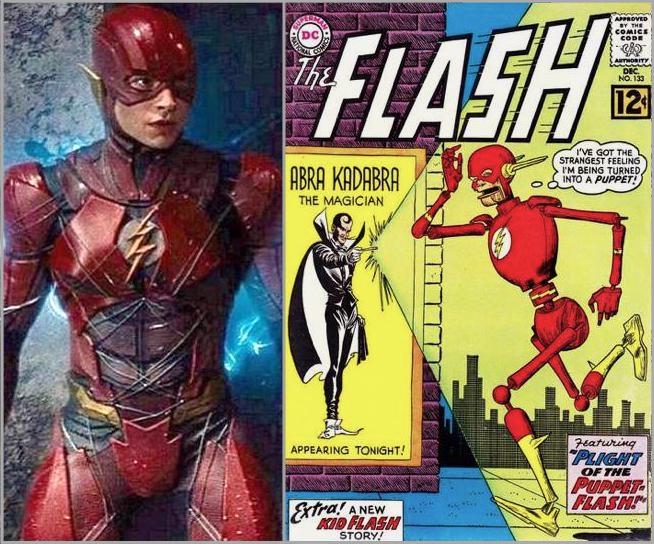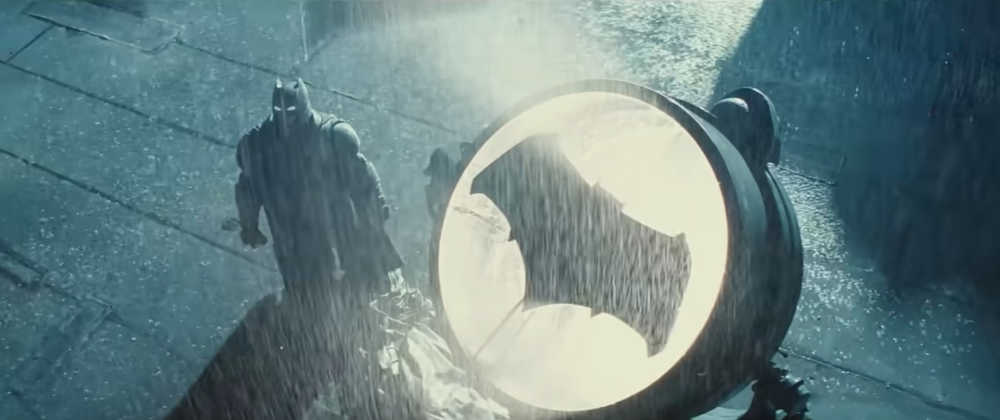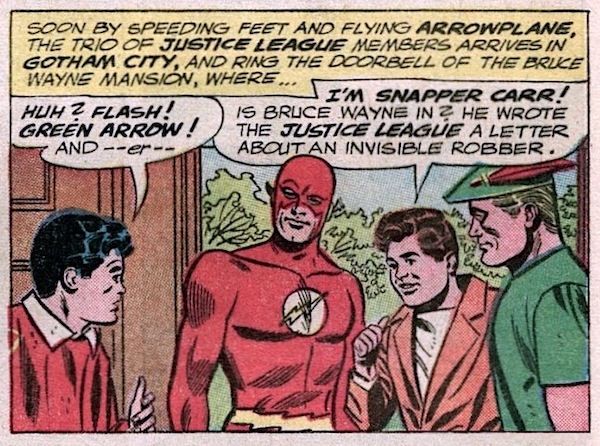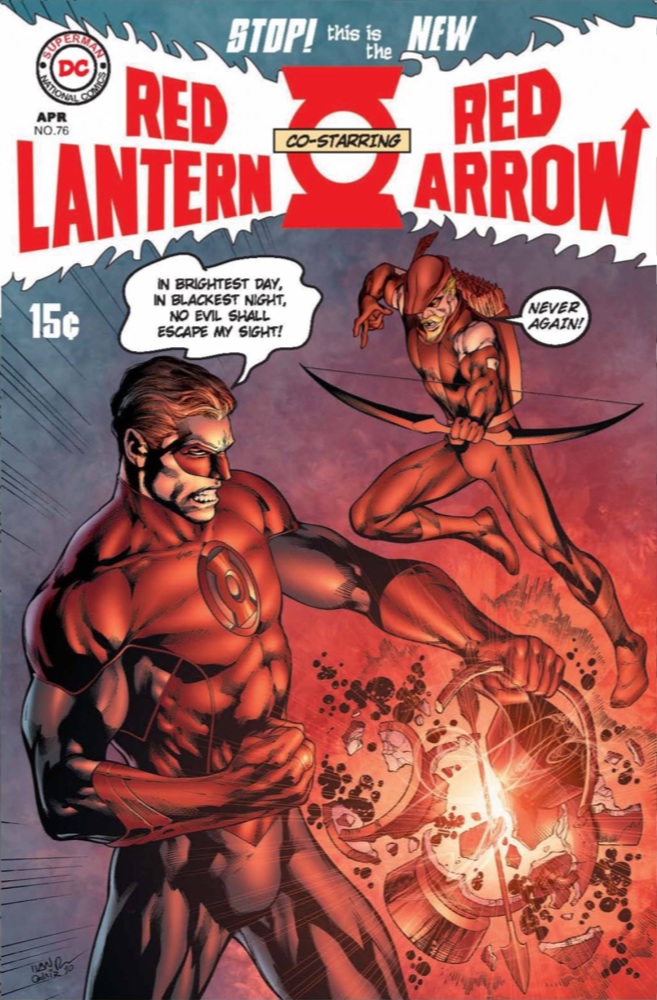I’m among those who saw the early trailer for and the new extended look at James Gunn’s upcoming Superman and wondered just why so much time was spent on a bloodied, battered Man of Steel.

Of course, I thrilled at the brief glimpses of him being heroic — flying with purpose
and protecting a child. And I get wanting to showcase Krypto; I do have concerns about the film, but not that shaggy fella beyond my perennial problem buying even the most impressive CGI.
A photo of The Flash as he’ll appear in Zack Snyder’s upcoming Justice League has been released. Right away I, well, flashed on the classic cover you can see next to it below.

I quite like how the CW TV incarnation turned out, especially with a white background having replaced the red on his chest insignia, despite the first promo shots featuring him in an extremely awkward position. We have a much clearer head-on look here than we did there, however. My big question, as Snyder and his associates were probably not meaning to homage this delightfully ridiculous old tale, is why and how Barry forged that grungy armor out of candied apples.
Cover of The Flash #133 © 1962 DC Comics. Pencils: Carmine Infantino. Inks:
Murphy Anderson. Letters: Ira Schnapp. Colors, Script: Unknown. [enlarge]
Related: No Small Parts • Kind of Blue • Stars and Gripes
 Teddy Sears as Jay Garrick in The Flash Ep. 2.01 “Flash of Two Worlds” © 2015
Teddy Sears as Jay Garrick in The Flash Ep. 2.01 “Flash of Two Worlds” © 2015
CW Network. Photo: Cate Cameron. Character TM/® DC Comics.
I didn’t see Tuesday’s Flash episode until after midnight — so it ended up a birthday present. And it was a gift to all the fans who’ve loved DC’s multiverse for decades. I’m honestly not able to put my reaction into words, because it basically involved giving
the astral projection of my 6-year-old self a high-five.
 We got a new trailer for Batman v. Superman: Dawn of Justice last month to coincide with the sprawling media crush of San Diego’s Comic-Con International.
We got a new trailer for Batman v. Superman: Dawn of Justice last month to coincide with the sprawling media crush of San Diego’s Comic-Con International.
I’ll admit that the movie looks impressive on its own terms. While Man of Steel had potential as a riff on the superhero genre with a heavy sci-fi bent, however, it was a terribly misguided Superman film. Based on the footage and conversations regarding its sequel, Zack Snyder continues to be at least as far off target in translating DC’s oldest, greatest icons from page to screen as he was in adapting Watchmen a half-dozen years back. (Read my non-spoiler post or my longer review of Man of Steel, and my detailed review of Watchmen, for more.)
Snyder et al. have jumped right to Frank Miller’s Dark Knight — a possible future extrapolating from the comics of the time in which a weathered Batman comes out of retirement and tangles with a godlike Superman whom he views as too powerful and too simplistic in the embrace of justice and the American Way — by setting up that dichotomy in the characters’ first meeting absent the weight of their history together. Huh?
 I’ve been trying for a while to finish a big piece on the recent flood of comics
I’ve been trying for a while to finish a big piece on the recent flood of comics
being adapted for television and film. One problem has been that I keep writing too much about a specific movie or show and then spinning that material off into its own review. The silver lining is that the flood is only picking up pace — so even as I constantly kick the metaphorical can down the road there’ll be no shortage of hooks
to keep the subject current.
I saw the latest Marvel flick this weekend and got into a new version of an old
debate: Thor vs. Superman.

Superhero films during the first three decades of my life were essentially limited
to Superman and then to Batman. A Thor movie, let alone more than one, was all but unthinkable. In my 30s it was pretty much just the Marvel stable and Batman’s resurgence, as Fox launched its X-Men dynasty, Columbia teed up a Spider-Man franchise, and even lesser Marvel-inspired films put DC, sister company to and/or division of Warner years before Marvel was purchased by Disney, in quite the awkward position regarding the dichotomy between its library of legendary characters and lack of live-action achievement.
 Standard cover to Justice League #1 © 2011 and characters TM/® DC
Standard cover to Justice League #1 © 2011 and characters TM/® DC
Comics. Pencils: Jim Lee. Inks: Scott Williams. Colors: Alex Sinclair.
This post is currently down for maintenance.
[continued from yesterday]
The Secret Six
Writer: Marc Andreyko / Artist: Stefano Gaudiano
Even among those beings of power and valor dedicated to patrolling the vast skies
and dank alleyways, few are aware of all that imperils humanity, peace, and the very existence of life as we know it. Yet through the ages demons and dark magic have ever lurked, and ever have six champions wielding sorcerous arts and artifacts been chosen by the mysterious Seventh to defend the world. The Secret Six follows the fractious endeavors of the latest such assembly, whose current membership consists of investigator Richard Occult; modern-day ronin Tatsu Yamashiro, alias Katana; the shaman known only as Doctor Mist; the enchantress named June Moon; the medicine woman called Manitou Dawn; and powerful but irreverent wizard John Constantine. Writer Marc Andreyko [DC’s Manhunter, Image’s Torso] and interior artist Stefano Gaudiano [DC’s Gotham Central, Marvel’s Daredevil], bring grim humor and grit to this crossroads of the literal and metaphorical underworld, with covers from The Unknown’s Erik Jones.
 cover to Green Lantern: No Fear
I should have saved last week’s post on Fringe’s crimson revision of DC Comics’ emerald adventurers for today. Migraines and other obstacles have put the squeeze on this piece. But it’s only St. Patrick’s Day for 18 hours more at most anywhere on the planet, so in the spirit of my green-themed posts from 2009 and 2010, here’s another one.
cover to Green Lantern: No Fear
I should have saved last week’s post on Fringe’s crimson revision of DC Comics’ emerald adventurers for today. Migraines and other obstacles have put the squeeze on this piece. But it’s only St. Patrick’s Day for 18 hours more at most anywhere on the planet, so in the spirit of my green-themed posts from 2009 and 2010, here’s another one.
I really need to write about Fringe more often. A couple of friends have been urging me to do periodic if not weekly reviews, but that’s almost certainly not in the cards. While I’m hoping to publish at least some thoughts about what’s happened on the show since my first major post on it this time last year, soon, right now I just want to finally clear my metaphorical desk of several images that have been on the docket to share for nearly that long.


The week after I finally got that piece up, Fox aired one of Fringe’s best episodes — confirming Peter Bishop’s origins and blowing the show’s mythology wide open. “Peter” was a flashback to 1985, with awesomely retro opening credits; it showed the Walter Bishop of the standard Fringe universe spying upon the denizens of a parallel universe whose history and technology were slightly divergent from the familiar but which was inhabited largely by close counterparts of Fringe’s Earth. Later in the season Peter Bishop returned to the alternate universe in the present day, and in Part Two of May’s season finale “Over There” we saw some intriguing framed comic-book covers in his room.
 The lateness of the hour, and the fact that everyone else in the multiplex was there to see Avatar on opening night, meant that the handful of us taking in The Princess and the Frog had the screening room almost entirely to ourselves. I found it absolutely magical. The Nine Old Men would be proud of this return to “2D” fairy-tale charm, and for it to be overlooked amidst the year-end onslaught of tent-pole spectacles and Oscar bait — worthy as those might be, too — is a tragedy.
The lateness of the hour, and the fact that everyone else in the multiplex was there to see Avatar on opening night, meant that the handful of us taking in The Princess and the Frog had the screening room almost entirely to ourselves. I found it absolutely magical. The Nine Old Men would be proud of this return to “2D” fairy-tale charm, and for it to be overlooked amidst the year-end onslaught of tent-pole spectacles and Oscar bait — worthy as those might be, too — is a tragedy.











